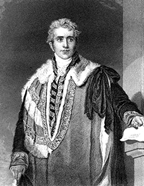Amherst, Lord
Amherst, Lord (1773-1857) goverr general of India from 1823 to 1828. He was born in January 1773. The Directors approved his appointment as he was already famous for his mission to China (1816) and was widely regarded as a man of peace. He arrived in Calcutta on 1 August 1823.

Prior to his assumption of office he was given the impression that there was occasion for wars in India and that a period of peace would prevail. But trouble soon erupted in East Bengal borders and this problem practically dominated his term of office. The King of Burma conquered Arakan and Assam and laid claims to the eastern parts of Bengal. In fact, he captured the Island of Shahpuri near Chittagong and drove away the English troops from this place. Amherst had to declare war and dispatched an army to repulse Burmese aggression. The Burmese army was defeated and the King had to sue for peace. This was achieved through the treaty of Yandaboo (1826) by which Assam, Arakan, and Tenasserim were ceded to the English.
While the war was in progress two incidents occurred. First, during the campaign the sepoys of the Bengal regiment rose in revolt at Barrackpur in October 1824. The Hindu sepoys objected to their crossing the sea, as it would defile their caste. But they were ruthlessly suppressed and the regiment was disbanded. Second, the wars with Burma led to unrest in mainland India. This found expression in Bharatpur (1826) over a disputed succession. When the Jat Raja of Bharatpur died, Durjan Sal, a pretender, seized power and proclaimed himself the Raja and became hostile to the British. After some hesitation Amherst ordered military action. The Bharatpur fort was stormed and captured and a son of the late raja, who accepted the Subsidiary Alliance, was put on the throne.
During his time the sanskrit college was established in Calcutta in 1824. He was the first goverr general to spend the summer of 1827 in Simla. He retried in March 1828 and was made an earl. Amherst died on 13 March 1857. [KM Mohsin]
